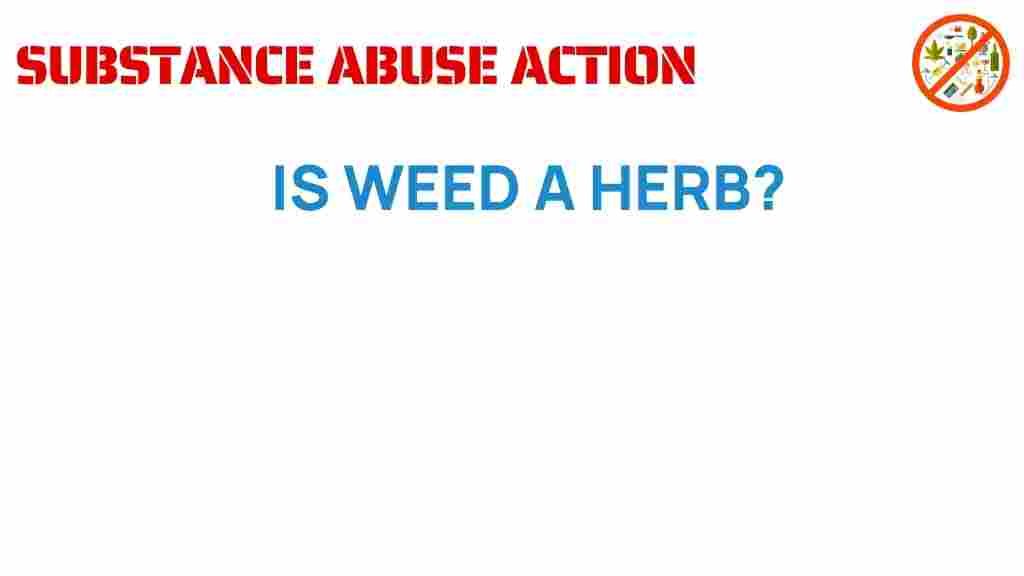Unpacking the Truth: Is Weed Really Just an Herb?
The debate surrounding weed, commonly referred to as cannabis, has grown increasingly complex over the years. While many consider it simply an herb, there are numerous misconceptions about its nature, usage, and benefits. In this article, we will unpack the truth about weed, exploring its cultural significance, health benefits, legal status, and the common misunderstandings that surround it.
The Nature of Weed: An Overview
Weed, or cannabis, is a plant that has been used for thousands of years for various purposes, including medicinal, recreational, and industrial applications. It contains a variety of compounds, the most notable of which are cannabinoids like tetrahydrocannabinol (THC) and cannabidiol (CBD). These compounds interact with the body’s endocannabinoid system, leading to various effects.
Common Misconceptions About Weed
Despite the growing acceptance of cannabis in many societies, several misconceptions persist. Here are some of the most common:
- Weed is just a drug: Many people view cannabis solely as a recreational drug, ignoring its medicinal properties.
- All forms of weed are harmful: While excessive use can lead to negative effects, many studies show that moderate use can have health benefits.
- Weed is illegal everywhere: The legality of cannabis varies widely across different regions, with many places allowing medical or recreational use.
- All cannabis is psychoactive: Not all cannabis strains produce the psychoactive effects associated with THC; CBD-dominant strains offer therapeutic benefits without intoxication.
Benefits of Weed: What Science Says
Research into the health benefits of cannabis is expanding rapidly. Here are some of the key findings:
- Pain Relief: Cannabis is frequently used to manage chronic pain, offering relief without the side effects associated with many pharmaceuticals.
- Reduction of Anxiety and Depression: Certain strains of cannabis can help alleviate symptoms of anxiety and depression.
- Anti-Inflammatory Properties: The cannabinoids in cannabis can help reduce inflammation, benefiting those with autoimmune diseases.
- Neurological Protection: Research has suggested that cannabis may have neuroprotective properties, beneficial for conditions like epilepsy and multiple sclerosis.
Cultural Significance of Weed
Weed has played a significant role in various cultures throughout history. In some societies, it has been used in spiritual practices, while in others, it has been a staple in traditional medicine. The cultural significance of cannabis continues to evolve as more people embrace its benefits and push for legalization.
Legal Landscape of Cannabis
The legality of weed varies significantly across the globe. Here’s a quick overview:
- Fully Legal: Countries like Canada and Uruguay have legalized cannabis for both recreational and medicinal use.
- Medical Use Only: Many U.S. states have legalized cannabis for medical purposes, but it remains illegal federally.
- Decriminalized: Some regions have decriminalized cannabis, meaning possession is not prosecuted, but sales may still be illegal.
- Illegal: In many countries, cannabis remains illegal, often resulting in severe penalties for possession or use.
How to Use Weed Responsibly
If you’re considering using cannabis, it’s essential to do so responsibly. Here’s a step-by-step guide:
1. Understand Your Local Laws
Before consuming weed, familiarize yourself with the local laws regarding its use and possession.
2. Choose the Right Strain
Different strains of cannabis have different effects. Research and choose a strain that aligns with your desired outcomes (e.g., relaxation, pain relief).
3. Start Low, Go Slow
If you’re new to cannabis, start with a low dose and gradually increase it to find your optimal level of comfort and effect.
4. Be Mindful of Your Environment
Consume weed in a safe and comfortable environment, preferably with trusted friends or alone if you prefer solitude.
5. Know When to Avoid It
It’s important to avoid using cannabis in situations where it might impair your ability to drive or operate machinery.
Health Considerations When Using Weed
While there are many potential benefits to using cannabis, there are also some health considerations to keep in mind:
- Potential for Addiction: While cannabis is generally considered less addictive than substances like alcohol or tobacco, some individuals may develop a dependency.
- Impact on Mental Health: For some, especially those with a predisposition to mental health disorders, cannabis may exacerbate symptoms.
- Lung Health: Smoking cannabis can negatively impact lung health, similar to smoking tobacco.
Tips for Troubleshooting Common Issues
If you encounter issues while using weed, consider the following troubleshooting tips:
- Feeling Anxious: If you experience anxiety after consuming cannabis, try taking deep breaths and focusing on calming activities. Consider using a strain with higher CBD content next time.
- Too High: If you feel overwhelmed, remember that the effects are temporary. Stay hydrated and eat something, as this can help ease the experience.
- Finding the Right Strain: Experiment with different strains to discover what works best for you, keeping a journal of your experiences.
Conclusion: The Future of Weed
As society’s understanding of weed evolves, so does its acceptance as a legitimate herb with numerous benefits. By dispelling misconceptions and embracing the science behind cannabis, we can appreciate its place in modern culture. Whether for medicinal or recreational use, it’s crucial to approach cannabis responsibly and informed.
For more information on cannabis and its effects, you can visit this comprehensive study. Additionally, if you’re interested in learning how to incorporate cannabis into your wellness routine, check out this guide.
Ultimately, understanding weed as not just an herb but a complex plant with a rich history and diverse applications will help shape its future in society.
This article is in the category Health and created by SubstanceAbuseAction Team
